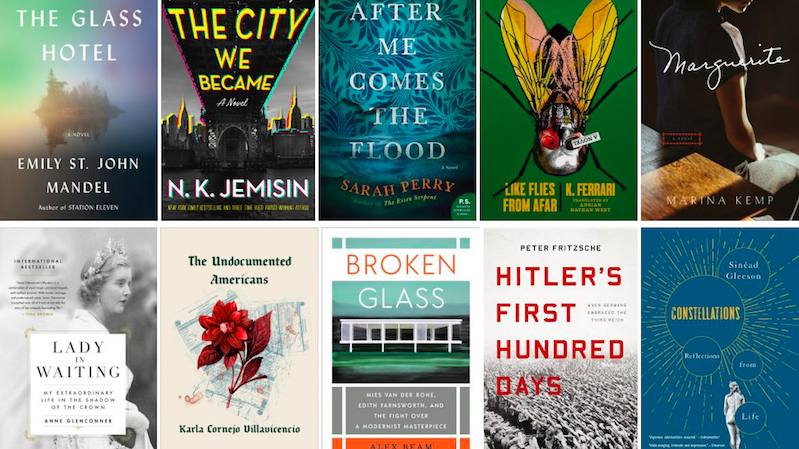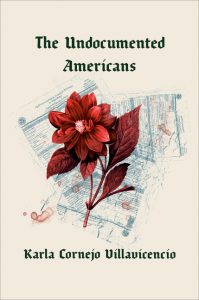
Emily St. John Mandel’s The Glass House, N. K. Jemisin’s The City We Became, Anne Glenconner’s Lady in Waiting, and Sarah Perry’s After Me Comes the Flood all feature among the Best Reviewed Books of the Week.
1. The Glass Hotel by Emily St. John Mandel
15 Rave • 7 Positive • 2 Mixed
“By some miracle, although it’s hard to determine what it’s about, The Glass Hotel is never dull. Tracing the permutations of its characters’ lives is like following the intricate patterns on Moroccan tiles. The pleasure, which in the case of The Glass Hotel is abundant, lies in the patterns themselves, not in anything they mean. This is a type of art that closely approximates life, and a remarkable accomplishment for Mandel, whose prose style in this novel is more transparent and less deliberately fussy and ‘literary’ than in Station Eleven. This novel invites you to inhabit it without striving or urging; it’s a place to be, always fiction’s most welcome effect.”
–Laura Miller (Slate)
Read an excerpt from The Glass Hotel here
Read Lori Feathers on the novels of Emily St. John Mandel here
2. The City We Became by N. K. Jemisin
5 Rave • 3 Positive
“The City We Became…is, in a way, a metaphor for Jemisin’s success, through her incredible body of work, at redefining the science fiction and fantasy genre—a genre that has long been defined by the tastes and stories of mostly white men. The monstrous forces that threaten the living New York City parallel the forces authors like Jemisin and her contemporaries have fought against for years … My only real issue with the book is that it comes to a relatively abrupt end. I want to binge on the entire series right now, which is the ultimate magic and allure of Jemisin’s work. She pulls you into her world and makes you want more; she makes you want to stay there forever … [the book] is…a celebration and an expression of hope and belief that a city and its people can and will stand up to darkness, will stand up to fear, and will, when called to, stand up for each other.”
–Steve Mullis (NPR)
Read an excerpt from The City We Became here
3. After Me Comes the Flood by Sarah Perry
3 Rave • 4 Positive
“Reading Sarah Perry’s extraordinary debut novel, it is hard not to reach for comparisons, if only in a bemused attempt to work out just why this book is so very good. On the surface, it seems straightforward … I could not put this book down … what Perry does here is to render the suspense metaphysical, one might even say environmental: we care about her characters, as we care about the characters in a novel by Thomas Hardy, say, but it is also the case that her dramatis personae, like Hardy’s, are transcended by the drama that unfolds in the land, in the air and, most of all, in the water that surrounds them … By the close…the careful reader emerges with a sense of having encountered a unique new writing talent, already working at a level of subtlety and restraint that many more seasoned novelists lack … What makes this novel truly remarkable is its unique vision, its skillful and sophisticated characterizations, and the creation, without unseemly effects, of an atmosphere that will haunt readers long after the final page.”
–John Burnside (The Guardian)
Read 10 rapid-fire book recs from Sarah Perry here
4. Like Flies From Afar by K. Ferrari
2 Rave • 5 Positive
“That’s a terrific set-up for a crime novel: The locked-room murder mystery transplanted to the cocoon of the car. Ferrari, however, is not after resolution so much as entanglement, a widening net of implication in which Mr. Machi finds himself ensnared … Ferrari’s plotting is ingenious, not only in the way it unveils the kaleidoscopic, potentially viral network of Mr. Machi’s connections, but also in how it shatters the illusion of his mastery to reveal ‘the great beast of paranoia’ within … Even as we shudder at the violence, we cannot help but appreciate the ironies … hardly a work of literary gamesmanship. Instead, it offers contrapuntal pleasures … What happens when your world blows up, when everything you thought you could count on is revealed to be a reverie? It’s a question a lot of us are asking in the surreal, occluded moment we have come to occupy.”
–David L. Ulin (The Los Angeles Times)
Read an excerpt from Like Flies From Afar here
5. Marguerite by Marina Kemp
3 Rave • 3 Positive
“…if you’ve ever felt that English literary fiction can be a bit anaemic, lacking in villains and general oomph, then step right up for the bastard offspring of Ian McEwan and Shirley Conran. That’s going a bit too far, but this debut novel delivers dramatic plot turns without embarrassment and has characters as unpleasant as they are sympathetic … this is a very physical book generally with a sensual appetite … Reminders of power and control ripple through every conversation … The rumour-fuelled village setting also enables Marina Kemp to explore how our minds allow stories and fears to bloom, not like flowers, but like weeds, until they overwhelm us … What we get from a novel is bound up in our expectations of it, so if a sultry setting with passive-aggressive people ends up delivering all sorts of soapy developments…it can provide a satisfaction that literary fiction often overlooks …For a story about a dying man, this is a book with plenty of life and passion in it. So for a rollercoaster of a read with serious intent, get on the ground floor and try this sexy, single-minded and occasionally silly debut.”
–John Self (The Times)
**
1. Lady in Waiting: My Extraordinary Life in the Shadow of the Crown by Anne Glenconner
4 Rave • 8 Positive
“Given [Glenconnor’s] proximity to the royals, I went into Lady In Waiting expecting juicy stories about Princess Margaret that would rival The Crown’s revelations—and Lady Glenconner, with her tales of partying with Mick Jagger on Mustique and attending Queen Elizabeth II’s coronation, delivered. What I didn’t expect, however, was tearing up while I read them … With a relentlessly matter-of-fact tone, Lady Glenconner acknowledges the extraordinary difficulties of her personal life … misfortune befell her five children in a way that seems almost mythic in its devastation. Her stiff upper lip never quivers … In Lady In Waiting, Lady Glenconnner balances the gossip you wanted with the story of a bygone lifestyle—and its costs—that you didn’t know you needed.”
–Elena Nicolaou (O: The Oprah Magazine)

2. The Undocumented Americans by Karla Cornejo Villavicencio
4 Rave • 1 Positive
“…[a] captivating and evocative first book …Villavicencio aims to tell ‘the full story’ of what it means to be undocumented in America, in all of its fraughtness and complexity, challenging the usual good and evil categories through a series of memoir-infused reported essays … Particularly in her depictions of immigrant women, Villavicencio reveals a fullness of character that feels subversive, simply because of how rare it is … Villavicencio writes chillingly, and fictionally, about undocumented immigrants whose full stories she can never know because they’ve hidden any trace of themselves out of self-protection … The Undocumented Americans offers little to those who think its subjects put themselves in a vulnerable position and should be punished for breaking the law. But even critics may find it challenging after reading the book to keep their minds from wandering toward the interior details, flattering and unflattering, of people they encounter who lack legal status.”
–Caitlin Dickerson (The New York Times Book Review)
3. Broken Glass: Mies Van Der Rohe, Edith Farnsworth, and the Fight Over a Modernist Masterpiece by Alex Beam
1 Rave • 5 Positive • 1 Mixed
“Broken Glass is an engrossing in-depth narrative of how the human interaction between client and architect produced a famous house. Mies van der Rohe was one of the most influential architects of the 20th century, and Mr. Beam provides an exceptionally perceptive character study of this complex and often impenetrable figure.”
–Witold Rybczynski (The Wall Street Journal)
=4. Hitler’s First Hundred Days: When Germans Embraced the Third Reich by Peter Fritzsche
1 Rave • 4 Positive • 1 Mixed
“Fritzsche’s 101 days certainly capture the scale of the upheaval and a swiftly coalescing sense of where the new Germany was headed … What makes Fritzsche’s telling so refreshing is that he uses all his skills as a writer and historian to stop us from drifting into that sense of foreknowledge … Especially thought-provoking are the eyewitnesses in this book, Germans who had nothing to do with the machinations of the elites, who watched events as they unfolded in the street, in their workplaces and apartment blocks, or frequented the great halls where the Nazi mass meetings were held … Fritzsche’s skill is in finding a wide enough cast of Germans to give a sense not just of the faithful, but of the skeptics, the disbelieving and the defeated. And it is here that the full value of telling his story through eyewitness testimony becomes clear. Fritzsche turns their surprise, ambivalence, enthusiasm or horror into far greater account than most other historians.”
–Nicholas Stargardt (The New York Times Book Review)
=4. Constellations: Reflections From Life by Sinéad Gleeson
1 Rave • 4 Positive • 1 Mixed
“…a collection of hard-won, highly-wrought, fiercely dazzling essays about life in one woman’s body … Things are changing, thanks to tireless campaigners like Gleeson. These essays are political and they tell of how a life can be saved several times and lived to the full, despite great pain, despite great obstacles … The essays are varied in form, breaking the boundaries between prose and poetry, using the white space of the page to experiment with free verse … Something tells me that Constellations will be here a long time…”
–Martina Evans (The Irish Times)

